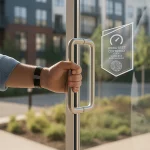Openreach Finish Superfast North Yorkshire UK Broadband Contract

The state-aid backed Superfast North Yorkshire (SFNY) project has announced that Openreach (BT) have officially completed their fibre-based (FTTC and FTTP) deployment contract under the scheme, which has so far enabled more than 190,000 extra premises to access faster broadband speeds since 2021 (take-up is at 80%).
The SFNY project is managed by NYnet (i.e. the North Yorkshire County Council-owned broadband company) and is financed by a mixture of funds from the Government’s Building Digital UK (BDUK) programme, EU, North Yorkshire County Council and some private funding from network suppliers.
According to the council, a total of 10,000 of the premises which have been upgraded more recently under the scheme have also been connected to a new ultrafast “full fibre” (FTTP) network with download speeds of up to one 1Gbps. But prior to that, most of the additional premises were added using slower Fibre-to-the-Cabinet (FTTC / VDSL2) technology.
Advertisement
The project is still ongoing with other suppliers (e.g. Phase 4 under Quickline), but Openreach was responsible for the lion’s share of delivery between Phases 1 to 3.
Council leader, Cllr Carl Les, said:
“The issue of poor broadband connectivity has been a long-standing problem for many parts of North Yorkshire, especially in communities in deeply rural areas.
But the county council is firmly committed to trying to provide improved connectivity and this has been clearly demonstrated by the Superfast North Yorkshire programme, which was embarked upon a decade ago.
The chance to introduce these improved broadband connections is vital for businesses in the 21st century, whether they are based in the biggest town or city or in the smallest village or hamlet.”
Openreach’s Partnership Manager, Matthew Lovegrove, said:
“The success of the Superfast North Yorkshire partnership is a great achievement and testament to the team who have worked so hard for the past 10 years.
Superfast North Yorkshire will continue to help communities to improve their broadband speeds working both with, and independently from, Openreach.
Our own commercial operation is currently building full fibre at pace across the county including Richmond, Pickering, Selby, Scarborough and Harrogate.”
Including commercial investment, more than 45,000 homes and businesses on the Openreach network in North Yorkshire can already upgrade to FTTP by placing an order with their chosen service provider.
However, the focus is now starting to switch to the Government’s Project Gigabit scheme, which has a number of new procurements that could help to extend 1Gbps speed broadband services to rural parts of North Yorkshire (here).
Mark is a professional technology writer, IT consultant and computer engineer from Dorset (England), he also founded ISPreview in 1999 and enjoys analysing the latest telecoms and broadband developments. Find me on X (Twitter), Mastodon, Facebook, BlueSky, Threads.net and Linkedin.
« WightFibre Become First UK Operator to Switch Off Copper Network





















































We’ve had reasonable FTTC in our NY village since 2014 (although Openreach’s wacky copper routing means that speeds and reliability aren’t what they could be), but not a sniff of FTTP yet. Hoping the Project Gigabit contracts start picking up the pace when finally awarded.
This example shows that BT/Openreach should never have received public funding in the first place, especially not with a 80% takeup! There are other more urgent needs for public funds to be spent on instead of giving it to this private telecom company which has no need for it.
“This example shows that BT/Openreach should never have received public funding in the first place, especially not with a 80% takeup”
That’d be OK if BT/Openreach were the only ones using the network, but OFCOM have forced BT/Openreach to offer discounted wholesale services for the last two decades, and other’s would have benefited from BT’s investment, while it would be impossible for BT to recover their investment. People seem to forget that the regulatory environment is what’s held BT back, I’m sure BT would have invested more historically, if they weren’t required to offer a discounted service to every other CP.
“This example shows that BT/Openreach should never have received public funding in the first place, especially not with a 80% takeup!”
Completely disagree, it’s surely a good use of public funding that a subsidised service is being used. It’s easy to say retrospectively that at 80% takeup it should be commercially viable, but then where was the commercial rollout before now? Didn’t exist.
Also, there are elements within the programme that mean take-up over the initially forecast amount is profit shared with the council and central government for re-investment in telecoms infra, so it’s wins all round really.
The BDUK claw-back is not a profit-sharing scheme, in the end the telecom company (e.g. BT/Openreach) owns all the assets and profits, not the government or council.
Threads like this are helpful because they flush out the charlatans on here.
These contracts have clear clawback rules which mean additional profits not forecast when the work was awarded are returned to the public body in line with their investment.
@GN.
‘in the end the telecom company (e.g. BT/Openreach) owns all the assets and profits, not the government or council.
You have said this before, what would a local council do with a load of fibre in Openreach ducts?
@Half an idea
“charlatans” really, I think you hiding behind a different name while saying it says more about you.